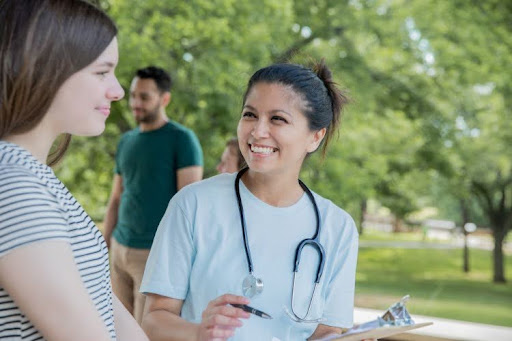Any of a variety of factors — such as poor environmental conditions, a lack of health education or difficulty accessing health care — can lead to poor health outcomes in a population. Public health nurses are instrumental in addressing these issues while empowering the populations they serve.
Professionals who are interested in a wellness-focused, equity-driven career can benefit from learning what it takes to become a public health nurse and how earning a Master of Public Health (MPH) degree can help.
What Does a Public Health Nurse Do?
Public health nurses focus on meeting the health needs of a specific community, such as a neighborhood, a city, a state or an entire country. While these professionals may sometimes address the specific medical needs of individuals in the community, they are more concerned with the community’s large-scale health concerns, such as communicable diseases, widespread chronic health problems and societywide mental and behavioral health issues.
Typical duties for a public health nurse include:
- Evaluating the community’s health status and identifying widespread issues
- Leading public health education initiatives
- Overseeing and participating in immunization campaigns, community health clinics and other health promotion and disease prevention programs
- Helping other public health professionals conduct research on community health issues
- Advocating for public health policy reform and advising policymakers on public health concerns
Some public health nurses work in traditional health care settings such as hospitals, but many work for public health departments, federal health agencies such as the U.S. Centers for Disease Control and Prevention (CDC) and nonprofit agencies. They also work for schools, community-based clinics, residential care facilities and private businesses.
Steps to Become a Public Health Nurse
Public health nurses must be well-versed in clinical patient care, epidemiology, health education and a wide range of other skills. Additionally, becoming a public health nurse typically involves gaining hands-on nursing experience and can include pursuing an advanced degree and a certification. This is especially true for nurses who want to take on leadership positions at public health agencies.
Step 1: Earn a Bachelor of Science in Nursing
The first step to become a public health nurse is to earn a Bachelor of Science in Nursing (BSN). While many future RNs start their journey by earning a diploma in nursing or an Associate Degree in Nursing (ADN), BSN programs offer a more advanced curriculum and set students up for the further training and education often required to work in public health.
In addition to offering classes on anatomy, clinical care and other nursing fundamentals, BSN programs also often include classes on public health nursing and related topics such as health promotion and nurse leadership. BSN students also get the chance to practice their skills in clinical, laboratory and simulation environments.
RNs who haven’t already earned a BSN can enroll in an accelerated program and earn their degree in as little as four semesters or about two years.
Step 2: Gain Experience and Earn a Certification
Before taking on a public health role, nurses often gain experience in patient care positions at traditional health care facilities such as hospitals. From there, nurses can pivot into an entry-level position at a community-based clinic, public health agency or nonprofit.
At this level, nurses typically support their more experienced colleagues as they identify and address widespread health issues. With a few years of experience, RNs can choose to earn an optional certification in public health or a more specific yet related field such as mental health nursing, gerontological nursing or informatics.
Step 3: Earn a Master’s Degree
Qualifications vary by employer, but a master’s degree is not generally required to be a public health nurse. However, leadership, management and administrative roles in public health nursing often require a master’s degree. While professionals have many options to consider, earning a Master of Public Health can help experienced RNs add leadership skills to their clinical expertise.
Over the course of about two years, MPH students learn vital public health skills in areas such as:
- Collecting and interpreting epidemiological data
- Analyzing and interpreting biostatistical data
- Addressing environmental health issues, health disparities and social determinants of health
- Measuring care performance, risk management and other factors on a communitywide scale
- Running evidence-based health promotion campaigns
- Designing and advocating for effective public health policies
With this skill set, RNs can work as a public health nurse in any of a number of settings. They also can choose to pursue another role in public health. They can be epidemiologists who study health trends and disease, public health educators, program managers or researchers, for example.
Public Health Nurse Salary and Job Outlook
RNs had a median annual salary of $86,070 as of May 2023, according to the U.S. Bureau of Labor Statistics (BLS). Those in the top 10 percent of earners made over $132,680.
The BLS projects employment of RNs will increase by 6 percent from 2023 to 2033, which is equivalent to 197,200 new jobs. Additionally, the BLS expects the community health workforce to grow by 13 percent in the same period. This indicates that nurses who specialize in public health could have ample career opportunities in the coming years.
Bring Health and Well-Being to a Community
Being a public health nurse requires a unique combination of clinical know-how, leadership skills and social awareness. Through the Master of Public Health program at Augusta University Online, you can learn the skills needed to become the informed advocate and public health nurse every community deserves.
While all of AU Online’s MPH students take classes on epidemiology, environmental health and other fundamentals, they can also choose from one of three concentrations: Health Informatics, Health Management or Social and Behavioral Sciences. If you’re already an experienced RN, one of these tracks can help you tailor your skills to be able to tackle a wide range of public health issues.
Pursuing your degree online can give you the flexibility to balance your career and education. And through a capstone project and a two-credit internship, you can gain the hands-on experience you need to learn the complexities of this field.
Working RNs may prefer to consider pursuing a post-baccalaureate Certificate in Public Health from AU Online. This program allows students to develop foundational knowledge and advanced skills in public health while learning from experienced MPH faculty.
To learn more about either of these public health programs from AU Online, request more information today.
Recommended Readings
What Does an Epidemiologist Do?
What Is a Health Promotion Specialist?
What Is Community Health? Issues and Careers
Sources:
American Nurses Association, Public Health Nursing
American Nurses Association, “Tips for Passing the NCLEX Exam”
American Nurses Credentialing Center, Our Certifications
Association of Public Health Nurses, What Is a PHN?
Indeed, “How to Become a Public Health Nurse (With Steps and Skills)”
National Board of Public Health Examiners, Public Health Nursing Certification
U.S. Bureau of Labor Statistics, Community Health Workers
U.S. Bureau of Labor Statistics, Registered Nurses
 Augusta University
Augusta University




